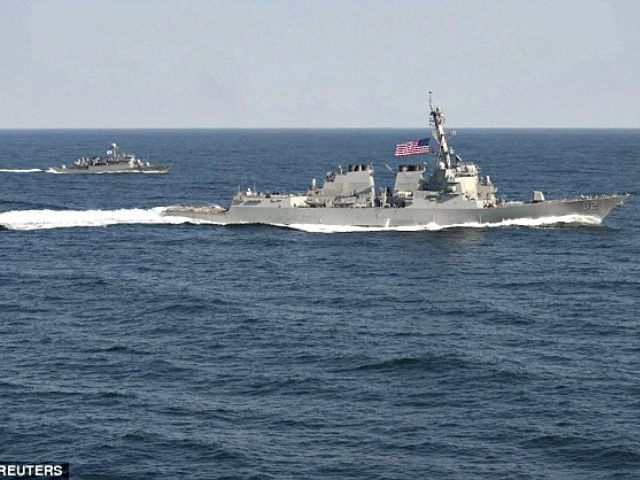An American defense official said this week that the U.S. Navy is planning to navigate through disputed waters in the South China Sea “about twice a quarter or a little more than that,” activity likely to irritate China, which claims complete control over the sea, even further.
The Guardian quotes an unnamed “U.S. Defense official” confirming the timeframe for new Navy missions in the region. The official describes the timing as “the right amount to make it regular but not a constant poke in the eye” and meeting “the intent to regularly exercise our rights under international law and remind the Chinese and others about our view.”
The remarks follow a week of high tension between China and the United States, as the USS Lassen, a U.S. Navy guided missile destroyer, sailed within 12 nautical miles of the Spratly Islands in the South China Sea, where the Chinese military has been building artificial islands and military facilities and working to keep neighboring countries from passing through. The Chinese government condemned the “illegal entry” of the Lassen into the South China Sea and claimed its presence “put the safety of personnel on the reefs in danger.”
The U.S. official’s comments, notes The Guardian, echo those of U.S. Deputy National Security Advisor Ben Rhodes, who said America would continue to “demonstrate that we will uphold the principle of freedom of navigation” in the region.
Chinese officials claim the principle of freedom of navigation does not apply to the entire South China Sea because it is sovereign Chinese territory. “The islands and reefs in the South China Sea are Chinese territory since ancient times. They are left to us by our ancestors,” President Xi Jinping told an audience in Seattle in October. “The Chinese people will not allow anyone to infringe on China’s sovereignty and related rights and interests in the South China Sea.”
The governments of Vietnam, Malaysia, the Philippines, Taiwan, and Brunei contest the Chinese claim to controlling the sea. The Guardian notes that $5 trillion in trade passes through the South China Sea on average every year.
Other American voices have joined the aforementioned in confirming that the Navy will have a role to play in the region. “We’ve been conducting freedom of navigation operations all over the world for decades, so no one should be surprised by them,” said United States Pacific Command head Admiral Harry B. Harris, Jr. on Tuesday. “The South China Sea is not, and will not, be an exception.” His statement is near identical to one made by Secretary of Defense Ashton Carter in October that American ships “will fly, sail and operate wherever international law allows,” including the South China Sea.
In response to Carter’s remarks, Chinese state-controlled media published a number of editorials warning that China is not afraid to “use force” against American vessels it considers a threat. Official remarks from the Chinese government have been more subdued in threats, but equally outraged. “The two countries should have a correct understanding of each other’s strategic intentions and strengthen pragmatic cooperation at all levels to expand common interests by thinking in an innovative way,” President Xi said Tuesday, according to state-run military news outlet The People’s Liberation Daily. China, warned senior military official Yi Xiaoguang, “will take all the necessary measures to champion national sovereignty.”
The nations disputing China’s claim over the body of water are supporting America’s presence in the region. Hishammuddin Hussein, the Defense Minister of Malaysia, told reporters on Tuesday that it was “very important” for America to have a role to play in the region. He issued the caveat that he opposed any “risk of escalation” but welcomed support for claiming the territory “international waters.”
Japan, which makes no claims in the South China Sea but disputes control of the Senkaku Islands in the East China Sea with China, is reportedly working to condemn Chinese aggression in the region during this year’s Association of Southeast Asian Nations (ASEAN) meeting. A source told Al Jazeera Japanese officials were urging Malaysia to introduce a statement condemning China’s militarization of the region in the official statement to be released regarding the issues facing the ASEAN nations today.

COMMENTS
Please let us know if you're having issues with commenting.